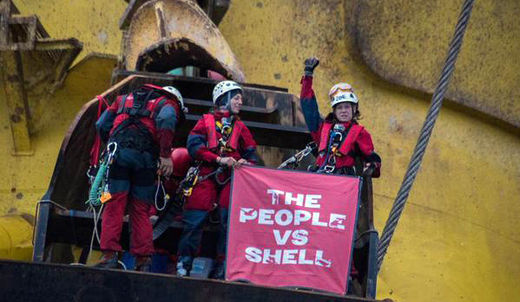
The Obama administration on May 11 gave conditional approval to allow Shell to begin drilling for oil off the Alaskan coast this summer, following years of fierce opposition to the potentially disastrous practice. This could prove devastating to environmentalists, and a serious and upsetting road bump in President Obama’s path to an otherwise progressive environmental agenda.
The Interior Department, which is granting the approval, said that the official go-ahead remains pending until Shell acquires whatever remaining permits it needs, including from the Bureau of Safety and Environmental Enforcement.
Shell’s dabbling in the Chukchi Sea, most feel, is now inevitable. For the moment, the Beaufort Sea won’t be touched, but even that could change. Activists fear that an incident in the Arctic waters is not a matter of if, but when, and that, furthermore, a spill would pose an even larger threat than the Deepwater Horizon disaster, because of the remoteness of the area.
Abigail Ross Hopper, director of the Interior Department’s Bureau of Ocean Energy Management, remarked, “We’ve taken a thoughtful approach to carefully consider potential exploration in the Chukchi Sea.” Many are bewildered by such a statement. As carefully as the matter is considered, and no matter how high the safety standards will be, history has taught that the possibility of an oil disaster is always in the cards.
Susan Murray, vice president of Oceana, said, “Once again, our government has rushed to approve risky and ill-conceived exploration in one of the most remote and important places on Earth. Shell has not shown that it is prepared to operate responsibly in the Arctic Ocean, and neither the company nor the government has been willing to fully or fairly evaluate the risks of Shell’s proposal.”
Activists continue to fight Shell
That proposal is particularly disconcerting because the Obama administration should know better, given past dealings with the company’s agenda. It had previously granted Shell a permit in 2012, but the first expedition into the new waters resulted in a number of embarrassing blunders for the corporation.
Shell had to halt exploration at one point due to obstruction caused by moving ice. And most notably, one of its oil rigs, the Kulluk, ran aground that year and had to be towed to safety.
After a wave of vindicated activists continued to fight Shell’s efforts, the Interior Department determined that the company had to cease its activities until all safety issues were addressed. Now, Shell is back in the saddle, as it were, and the opposition to its plan is quickly returning.
Thomas Lorenzen, former assistant chief at the U.S. Department of Justice’s environment and natural resources division, tried to quell the fears, saying that Shell “recognizes the challenges” with drilling, and that “the proposed exploration is in very shallow waters – only 140 feet deep – and thus it will not present the challenges that the Deepwater Horizon spill posed; that well was in water about 5,000 feet deep.”
This can be seen as a rather obfuscating statement, as there are other concerns surrounding Arctic drilling that did not apply to explorations in the Gulf of Mexico. For one, a plume of oil in the Chukchi Sea could freeze, hindering cleanup efforts and prolonging the issue. And then there’s the simple fact that a large enough spill will not necessarily simply remain in the area where it happened, and despite the shallow depth of the shelf sea, the further the oil spreads, the more water is poisoned and the more wildlife is affected.
“This decision places Big Oil before people, putting the Arctic’s iconic wildlife and the health of our planet on the line,” said Erik Grafe, attorney for Earthjustice. “The agency should not be approving such threatening plans based on a rushed and incomplete environmental and safety review. Ultimately, Arctic Ocean drilling is far too risky and undermines the [Obama] administration’s efforts to address climate change and transition to a clean energy future.”
Michael Brune, executive director of the Sierra Club, added, “Both science and common sense [are] crystal clear in telling us that undeveloped dirty fuels, especially those in the Arctic, must remain in the ground if we are to avoid the worst consequences of climate disruption. Downplaying the threats drilling poses to our climate, communities, and environment – as Shell continues to do – does not, in reality, make the threats any less serious. The Obama administration must say no to drilling in America’s Arctic Ocean.”
“Instead of holding Shell accountable and moving the country toward a sustainable future, our federal regulators are catering to an ill-prepared company in a region that doesn’t tolerate cutting corners,” said Greenpeace senior research specialist Tim Donaghy. “Shell has a history of dangerous malfunctioning in the Arctic, while global scientists agree that Arctic oil must stay in the ground if we’re to avoid catastrophic climate change.”
Shell wants to silence the opposition
Shell, meanwhile, is doing its utmost to silence the voices of opposition, and Greenpeace, one of the organizations that has perhaps done the most to disrupt its drilling activities, is no exception. On May 8, a federal judge ruled that Greenpeace protesters must stay away from Royal Dutch Shell ships in the Arctic, and that they also cannot fly drones over the area where Shell plans to drill. This injunction is to remain in place until Oct. 31. This was the resolution to a court battle that stemmed from a lawsuit filed by the oil giant on Apr. 7, after six Greenpeace activists boarded the Blue Marlin, a ship carrying a drilling unit that will likely be used in the Chukchi Sea.
In what many see as a classic case of the pot calling the kettle, Shell claimed that the lawsuit was necessary, remarking, “We don’t want a repeat of previous stunts. We cannot condone Greenpeace’s unlawful and unsafe tactics. Safety remains paramount.”
Greenpeace spokesman Travis Nichols criticized the ruling, firing back, “Instead of saying Greenpeace can’t go near Shell, our government should be saying Shell can’t go near the Arctic.”
Whether activists can still manage to openly interfere with Shell’s operations remains to be seen. And as to whether that potential dreaded oil spill does indeed occur in the Chukchi Sea, time will tell. But one thing is for certain: according to estimates of the Bureau of Offshore Energy Management, the cleanup response for a spill there would likely cost somewhere between $10 and $15 billion. If Shell decides to expand its activities into the Beaufort Sea, cleanup costs for a mess of crude could be between $12 and $27 billion for that area.
“Companies like Shell cannot run from the reality that proposed oil drilling creates enormous risks for the ocean,” said Oceana CEO Andrew Sharpless. “As we learned from Shell’s experience in 2012, the Arctic Ocean is remote and unforgiving. There is no proven way to clean up a spill in icy Arctic conditions.”
Photo: Greenpeace activists board a Shell ship in April. Such activists will now be barred from going near Shell’s disconcerting activities in the Arctic. | Greenpeace.org












Comments